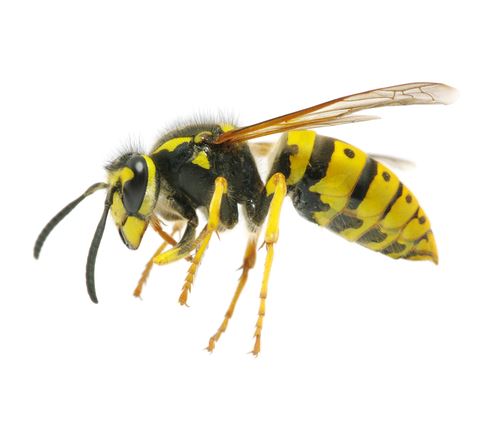How to Get Rid of Bees & Wasps
Bees, wasps, and other stinging insects are necessary for the ecosystem to function properly, but that does not mean you necessarily want them near your house! Especially if anyone in your family is allergic to bee and wasp stings, it is very important that you exercise DIY pest control to keep them away from you and your loved ones.
Here are some products and techniques you can use as bee and wasp repellents:
Essential Oils
There are several essential oils you can use to safely and effectively repel wasps. Peppermint oil on its own has been shown to act as a natural repellent for wasps and bees, or you can use a combination of clove, geranium, and lemongrass essential oils as a natural pest control method. To utilize these oils properly, mix several drops with water and a little dish soap, add to a spray bottle, and coat the outside areas of your home where wasps are likely to build nests (under eaves, porch roofs, and other ledges and crevices.)
Wasp Traps
 If a wasp and bee repellent is your first choice, setting out a wasp trap is an age-old method that is inexpensive and effective. These traps work by luring in the wasps/bees with a tempting substance, like sugar water, and preventing them from making their way back out. You can make a trap yourself by cutting the top off a two-liter bottle and inserting it inside the bottom, or you can purchase some online or from your local home and garden retailer.
If a wasp and bee repellent is your first choice, setting out a wasp trap is an age-old method that is inexpensive and effective. These traps work by luring in the wasps/bees with a tempting substance, like sugar water, and preventing them from making their way back out. You can make a trap yourself by cutting the top off a two-liter bottle and inserting it inside the bottom, or you can purchase some online or from your local home and garden retailer.
Soap and Water
If you do not want to spend any more money on pest control than you already do, you can effectively repel wasps with two substances you already have in your home: soap and water! This classic combination creates a wasp repellent that clogs wasps’ breathing pores, which causes them to perish almost instantaneously. Add two tablespoons of dish soap to a spray bottle filled with water and spray at/around any nests you see. (Be careful to not get stung, though!)
Insect-Repelling Plants
Did you know that there are some plants that naturally repel wasps? It’s true! If you plant some citronella, thyme, or eucalyptus (or all three!) in your yard, wasps will naturally be less likely to remain in the area. Plus, not only do these plants repel wasps, they add quite a bit of beauty to your yard.
Patch up Cracks & Make Repairs
Even worse than having wasps or bees in your yard is discovering them inside your home! The best way to keep these pests out of your home is to prevent them from coming in in the first place. Do this by sealing tiny cracks in your home with a waterproof caulk and patching up holes in window screens (or replacing them). This pest control method is most effective during the winter or the beginning of spring before wasps become active. For extra protection, you can create your own bee repellent using essential oils, or soap and water to spray the area where wasps and bees nest.
Dispose of Waste Properly
If you already have a wasp or bee problem, having easily accessible food waste around can exacerbate it. Be sure to never dispose of food waste in your yard, and tightly seal your outdoor waste bins. Additionally, if you have a compost pile that is causing pest control problems, you might want to consider composting indoors.
Aerial Nets
This pest control method is slightly riskier than the others, but it is very effective if you have a wasp problem that requires immediate attention. To eliminate all of the wasps that are living in a nest by your home, you can use an aerial net to cover the wasps’ nest and trap them. From there, you can carefully place the nest and net in a bucket of water to drown the wasps inside and prevent them from harming you and your family. Be careful, though, because if you are not able to contain the wasps, one of them could sting you!
DIY Approach Not Working? We Can Help!
At McCauley Services, our mission is to protect your property. If you need help repelling wasps and bees or just general pest control in Arkansas and Oklahoma, call McCauley Services at (888) 733-9229.


